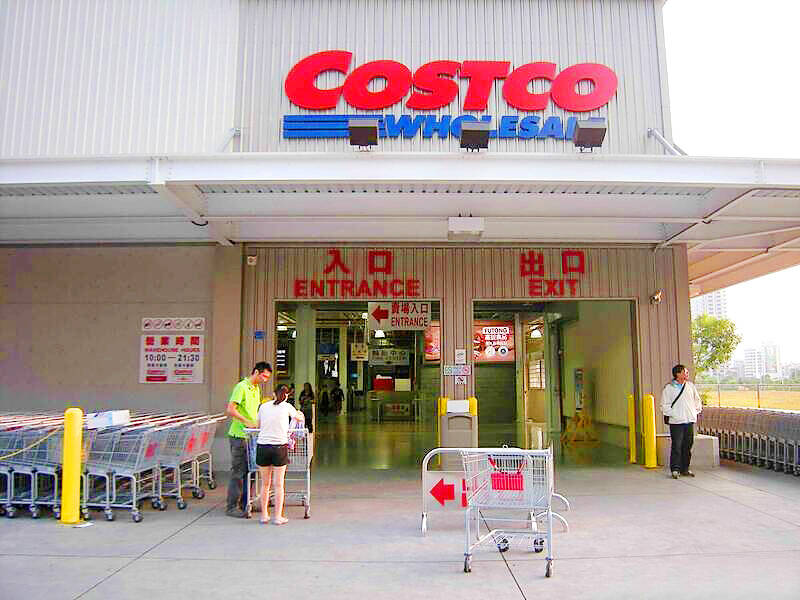Taipei Fubon Commercial Bank (台北富邦銀行), the flagship retail banking arm of Fubon Financial Holding Co (富邦金控), is to introduce a co-branded credit card with warehouse club Costco Wholesale Taiwan Ltd (台灣好市多) on Feb. 1.
A media invitation for this event this week confirmed that Taipei Fubon Bank has taken over rival Cathay United Bank’s (國泰世華銀行) deal to partner with Costco on a co-branded credit card.
Cathay United Bank, the banking arm of Cathay Financial Holding Co (國泰金控), announced in November last year that it would end a decade-long credit card partnership with Costco on Aug. 7 this year amid speculation that Taipei Fubon Bank had spent NT$1.2 billion (US$39.52 million) to snatch the co-branding rights from Cathay United Bank.

Photo: Wu Hsin-tien, Taipei Times
Taipei Fubon Bank had not commented on the speculation until recently, when it said it would provide attractive privileges to cardholders to make the new co- branded credit cards a “must have” for consumers.
Costco only accepts co-branded credit cards for non-cash payments in its stores.
There are currently 2.7 million holders of Cathay United Bank’s Costco co-branded credit cards, but after the bank’s partnership with Costco ends on Aug. 7, those cardholders will no longer be able to use their cards to buy goods at Costco’s 14 stores in Taiwan.
People who get Taipei Fubon Bank’s co-branded credit card with Costco will not be able to use it at Costco outlets before Aug. 7, but will be able to use it like any other credit card to make purchases elsewhere.
Cathay United Bank is the second-largest credit card issuer in Taiwan, having issued 7.89 million credit cards as of September last year, behind CTBC Bank (中信銀行), a unit of CTBC Financial Holding Co (中信金控), with 8.33 million, analysts said.
Cathay United Bank, however, has 5.57 million active credit cards, defined as cards used to make purchases within the past six months, 387,192 more than CTBC Bank, analysts said.
In 2013, Cathay United Bank took over the co-branded credit card agreement with Costco from CTBC Bank.
Once Taipei Fubon Bank takes over the co-branded credit card deal with Costco, it should see its active credit cards grow to 5.64 million, topping Cathay United Bank.
It will also move up two notches to become the third-largest credit card issuer in Taiwan, with the number of credit cards issued increasing from about 4.8 million at present, according to analysts.
According to Cathay United Bank, holders of its Costco co-branded credit card will be given the chance to transfer those cards to the soon-to-be-launched CUBE credit card program.

Shares in Taiwan closed at a new high yesterday, the first trading day of the new year, as contract chipmaker Taiwan Semiconductor Manufacturing Co (TSMC, 台積電) continued to break records amid an artificial intelligence (AI) boom, dealers said. The TAIEX closed up 386.21 points, or 1.33 percent, at 29,349.81, with turnover totaling NT$648.844 billion (US$20.65 billion). “Judging from a stronger Taiwan dollar against the US dollar, I think foreign institutional investors returned from the holidays and brought funds into the local market,” Concord Securities Co (康和證券) analyst Kerry Huang (黃志祺) said. “Foreign investors just rebuilt their positions with TSMC as their top target,

REVENUE PERFORMANCE: Cloud and network products, and electronic components saw strong increases, while smart consumer electronics and computing products fell Hon Hai Precision Industry Co (鴻海精密) yesterday posted 26.51 percent quarterly growth in revenue for last quarter to NT$2.6 trillion (US$82.44 billion), the strongest on record for the period and above expectations, but the company forecast a slight revenue dip this quarter due to seasonal factors. On an annual basis, revenue last quarter grew 22.07 percent, the company said. Analysts on average estimated about NT$2.4 trillion increase. Hon Hai, which assembles servers for Nvidia Corp and iPhones for Apple Inc, is expanding its capacity in the US, adding artificial intelligence (AI) server production in Wisconsin and Texas, where it operates established campuses. This

US President Donald Trump on Friday blocked US photonics firm HieFo Corp’s US$3 million acquisition of assets in New Jersey-based aerospace and defense specialist Emcore Corp, citing national security and China-related concerns. In an order released by the White House, Trump said HieFo was “controlled by a citizen of the People’s Republic of China” and that its 2024 acquisition of Emcore’s businesses led the US president to believe that it might “take action that threatens to impair the national security of the United States.” The order did not name the person or detail Trump’s concerns. “The Transaction is hereby prohibited,”

Garment maker Makalot Industrial Co (聚陽) yesterday reported lower-than-expected fourth-quarter revenue of NT$7.93 billion (US$251.44 million), down 9.48 percent from NT$8.76 billion a year earlier. On a quarterly basis, revenue fell 10.83 percent from NT$8.89 billion, company data showed. The figure was also lower than market expectations of NT$8.05 billion, according to data compiled by Yuanta Securities Investment and Consulting Co (元大投顧), which had projected NT$8.22 billion. Makalot’s revenue this quarter would likely increase by a mid-teens percentage as the industry is entering its high season, Yuanta said. Overall, Makalot’s revenue last year totaled NT$34.43 billion, down 3.08 percent from its record NT$35.52